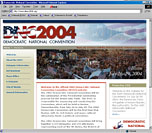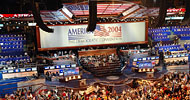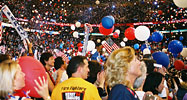
"an ad hoc coalition whose purpose is supporting protestors of the DNC. We aim to create a space for others to protest the DNC and exercise their first ammendment rights."






| Democratic
National Convention FleetCenter in Boston July 26-29, 2004
Heading to Boston > |
|
|
||||||||||||
| On July 26-29, 2004 Boston, a
city steeped
in political history, held its first national political convention as
the
Democrats met at FleetCenter to nominate Sen. John F. Kerry and Sen.
John
Edwards as the party's candidates for president and vice
president.
With the nominees and the platform effectively settled, the main
question
was how well Kerry could make his case to the American people.
The
Massachusetts Senator had already been campaigning for a year and a
half,
but news coverage suggested that voters have not "warmed up to
him."
Kerry's many months on the campaign trail have given him the
opportunity
to refine his message, and hone his speaking style. Now, the
stage
was set.
Over a year of planning went into the convention. Inside FleetCenter workers built a set 60-plus feet tall and 170 feet wide, complete with a 90-foot by 17-foot video screen and a 55-foot wide American flag overhead. 4,341 delegates and 610 alternates travelled from the 50 states, DC, territories, and abroad to participate; according to the party this was its most diverse convention ever. Although network coverage was reduced from past levels, cable, print and and Internet media, including bloggers, provided abundant reporting.1 Security was tight in view of concerns about a possible terrorist attack. In his acceptance speech on Thursday night, Kerry declared that "...we are here tonight united in one simple purpose: to make America stronger at home and respected in the world." The next day Kerry and Edwards embarked on a "Believe in America" tour, heading out into battleground states. The convention demonstrated unity, but did not generate much of a bounce in the polls. Kerry's campaign had earlier pointed out that the relatively small number of undecided voters made a sizable bounce unlikely. Nonetheless a post-convention memo2 from the Democracy Corps (James Carville, Stanley Greenberg), while acknowledging some accomplishments, stated that the "small shift in the vote is disappointing." As for the City of Boston, according to an analysis3 by the Beacon Hill Institute at Suffolk University, the convention generated benefits of $156.7 million but cost $141.9 million in lost spending due to "displaced events and lost tourist and commuter spending" for a net gain fo $14.8 million. -The U.S.
Department of Homeland
Security in 2003 designated the Democratic National Convention as a
National
Special Security Event; security
preparations involving federal, state and local authorities were
under
way for over a year. -Conventions
provide fertile ground for fundraising activity (donors).
-The Kucinich
campaign opened a Convention headquarters in Boston, headed by Tim
Carpenter, on May 10, 2004 and engaged in a range of activities.
-Various groups demonstrated during the Convention. The City of Boston required groups and individuals wishing to stage events from July 24-August 1 to obtain a permit. Applications were to be submitted 14 days before the proposed event. Over two dozen groups and individuals, ranging from the American Friends Service Committee and the A.N.S.W.E.R. Coalition to Democrats for Life and Vietnam Veterans Against Kerry planned events. A sanctioned
demonstration
zone, with a stage and sound system, was located "on a parcel of land
adjacent
to Canal Street near the bus depot where delegates will be arriving for
the convention." The space, under a no longer used elevated track
and surrounded by netting, fencing and razor wire, was described as a
cage
or pen and was the subject of a legal challenge. In a preliminary
injunction hearing on July 22, 2004 U.S. District Court Judge Douglas
P.
Woodlock declined
to
intervene while stating that, "One cannot conceive of what other
elements you would put in place to make a space more of an affront to
the
idea of free expression than the designated demonstration zone.
But
I add what I said before: With adequate reason." While
individuals
and very small groups used the official zone to espouse their views, a
number of larger demonstrations and events took place around the city.
-The Boston
Police Patrolmen's Association was in a two-year contract dispute
with
the City of Boston and had promised to picket events attended by Mayor
Menino; a settlement was imposed just days before the convention
started. >
-Republican
leaders were
on hand to "rebut John Kerry's extreme makeover." "John Kerry is
a far left duckling that hopes to emerge from his convention as a
center
swan," stated RNC Chairman Ed Gillespie in July 2004 conference
call.
"We realize we’ll be swimming upstream, but each day of the Democratic
Convention, we’ll have an anger management session. We will talk
about what’s coming that day in the Democrat Convention Program, as
well
as some of the specifics in the platform...," said Gillespie. The
RNC on July 21 launched a www.demsextrememakeover.com
website; it had about 30 staff in Boston, and held daily press
conferences
at 10 a.m.. Notes:
2. Democracy Corps (strategy memo). "From Small Bounce to Big Opportunity." August 9, 2004. > 3. Beacon Hill Institute at Suffolk University. "The Economic Impact of the Democratic National Convention on the Boston Economy: The Final Tally." August 9, 2004. > See Also:
|
|
www.dems2004.org
(07/19/04)
|
www.boston04.com
(11/03)
|
www.demsextrememakeover.com
(07/21/04-launched)
|
blackteasociety.org
(07/21/04)
|
 |
Bl(A)ck
Tea Society- "an ad hoc coalition whose purpose is supporting protestors of the DNC. We aim to create a space for others to protest the DNC and exercise their first ammendment rights." |
||
|
www.dems2004.org
(3/15/04)
|
Copyright © 2004 Eric M. Appleman/Democracy in Action.